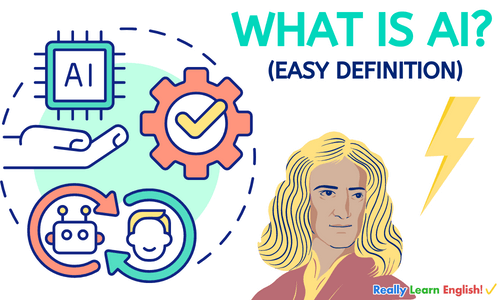What Artificial Intelligence Means (AI)
English Vocabulary Lesson
In this lesson, we will focus specifically on the meaning and definition of artificial intelligence. By the end of this lesson, you should have a clear understanding of what AI is and how it is used in the world today.

Lesson Table of Contents
1) Definition of AI (Artificial Intelligence)
2) Examples of Artificial Intelligence
3) What Is Not an Example of AI
4) Example Sentences with "Artificial Intelligence"
5) Example Sentences with "AI"
6) An Example Dialogue to Show How the Word "AI" Is Used in Context
7)
Another
Dialogue to Show How the Word "AI" Is Used in Context
Click Here for Step-by-Step Rules, Stories and Exercises to Practice All English Tenses
Definition of AI (Artificial Intelligence)
Artificial means not natural or not of living things.Intelligence means the ability to think, learn, and solve problems.
So when you put them together, artificial intelligence is the ability of a machine, computer, or another non-living thing to think, learn, and solve problems.
Machines use AI to recognize patterns, solve problems, and make decisions.
Examples of
Artificial Intelligence
AI is used in many different ways. Here are a few examples: Self-driving cars: Cars use AI to navigate roads and traffic, recognize objects on the road, and make decisions about what to do next.
Personal assistants: Virtual assistants like Apple's Siri and Amazon's Alexa are computer programs that help you do things. They understand and respond to voice commands.
Speech recognition: You use a machine to understand what someone is saying and turn it into written words. This can be helpful when you want to search for something or save information.
Finance: AI is being used to help make investment decisions, detect fraud, and improve efficiency in financial transactions.
Education: AI is being used to personalize learning and adapt to student needs, as well as to grade assignments and provide feedback. (See our lesson The Best AI Bot to Talk to for English Conversation and Practice)
These are just a few examples of what AI can do. As technology advances, so does the potential for artificial intelligence to do more and more.
What Is Not an Example of
AI
There are some things that people might think are artificial
intelligence, but they are not. For example, simple automation that follows a set of rules is not AI. AI involves learning and adapting to new situations. AI can change itself.
An example of simple automation that is not AI is a machine that is programmed to do a specific task when a button is pressed. For instance, a vending machine that dispenses a drink when a customer inserts money and selects their choice is not using artificial intelligence. It is just following a set of rules. It does not "learn from its mistake", evolve, and adapt to new situations.

Another example of something which does not use AI is the calculator app on your smartphone.
A calculator app is a program that can do basic math, like addition ( + ) and subtraction ( - ). It follows a set of rules to do these calculations, but it cannot learn or adapt to new situations like an AI system can. For example, if you type "2+2" into a calculator app, it will just use the rules of math to calculate the answer of 4. It cannot learn or change like an AI system.

Example
Sentences with "Artificial
Intelligence"
- "The company is investing in artificial intelligence to automate its manufacturing process."
- "My virtual personal assistant uses artificial intelligence to understand and respond to voice commands."
- "The new smartphone has built-in artificial intelligence that can recognize and respond to natural language commands."
- "We are using artificial intelligence to analyze social media data and improve our marketing strategies."
- "Artificial intelligence is being used to improve the accuracy and speed of financial transactions."
- "The company's chatbot uses artificial intelligence to understand and respond to customer inquiries."
- "The new self-driving car uses artificial intelligence to navigate and make decisions in real-time."
Example Sentences with "AI"
- "The new AI system is able to analyze customer data and make personalized product recommendations."
- "Our company is using AI to automate repetitive tasks and improve efficiency."
- "The AI algorithm was able to identify patterns in the data that human analysts had missed."
- "The AI system is able to learn from past experiences and adapt to new situations."
- "AI is being used to assist with investment decision making and fraud detection in the financial industry."
- "AI is being used to improve the accuracy and efficiency of supply chain management in various industries."
- "The AI algorithm was able to identify and diagnose problems with the manufacturing equipment."
- "Recruiters are using AI to scan resumes and find the best candidate for a job."
- "AI is being used to predict market trends and improve investment performance."
An Example Dialogue to Show How the Word "AI" Is Used in Context
Sarah: "I heard that the company is using artificial
intelligence to improve its marketing strategies. Is that
true?"Mike: "Yes, they're using AI to analyze customer data and make personalized product recommendations. It's been really effective."
Sarah: "Wow, that's really cool. How does the AI system work?"
Mike: "It uses machine learning algorithms to identify patterns in the data and make predictions or decisions based on those patterns. It's been able to improve the accuracy of the marketing campaigns and increase sales."
Sarah: "That's amazing. I can't believe how advanced artificial intelligence has become."
Mike: "Yes, it's really changing the way companies do business. There are so many possibilities with AI."
Sarah: "I'm a little worried about the impact AI might have on job markets though."
Mike: "It's definitely something to consider. But at the same time, AI can also create new job opportunities in fields like data analysis and AI development."
Sarah: "That's true. It's definitely a complex issue."
Mike: "Yeah, it's important to approach the use of AI responsibly and ethically. It's going to be an interesting area to watch as it continues to evolve."
Sarah: "Well, I'm just glad we won't have to rely on AI to make our coffee in the morning."
Mike: "I wouldn't be so sure! There are already AI-powered coffee makers out there!"
Sarah: "Oh my, what will they think of next?"
Mike: "Who knows? Maybe AI-powered phones to make our calls for us!"
Sarah: "Now that's a scary thought!"
Mike: "It sure is! Let's hope it's still a few years away."
Another Dialogue to Show How the Word "AI" Is Used in Context
Carlos: "I was told that the company's AI system made a big mistake in its pricing calculations!"Lila: "Yes, it was a really embarrassing mistake. The AI system made a calculation error that resulted in some customers being charged way too much for their orders."
Carlos: "That's not good. How did the company respond to the mistake?"
Lila: "Well, they immediately corrected the error and apologized to the affected customers. They also launched an investigation to find out what caused the mistake and how to prevent it from happening again."
Carlos: "Was the investigation conducted by AI?"
Lila: "No, they had human analysts review the data and look for patterns. They found that the AI system was making incorrect assumptions when analyzing the data. So they adjusted the algorithm and tested it before putting it back into production."
Carlos: "That's good to hear. I can imagine that would be frustrating for the customers. Do you think the AI system is reliable?"
Lila: "AI systems can be very reliable, but they are not perfect. There are always risks of errors or mistakes, especially if the system is not programmed or trained properly. It's important to carefully monitor and test AI systems to ensure they are working correctly."
Carlos: "I see. Do you think the company's reputation has been damaged by this mistake?"
Lila: "We've done extensive sentiment analysis and it doesn't appear that the mistake has had a major impact on public opinion."
Carlos: "Have you used AI to analyze the sentiment?"
Lila: "Yes, we used natural language processing to identify and analyze customer feedback and determine what people think about the company."
Carlos: "But what if the AI sentiment analysis was also flawed?"
Lila: "Are you suggesting that the AI is trying to cover up its own mistake? Hehe, no, that's not what we believe.
Carlos: "Well, I suggest we keep a close eye on what the AI system is doing, just in case."
Lila: "Good idea. Let's make sure we stay on top of what our AI system is doing. We don't want any more silly mistakes!"
Get Updates, Special Offers, and English Resources
Download your FREE GIFT (the first two chapters of
English Short Stories Book and Workbook)
as soon as you join!

By submitting your email, you consent to receiving updates and newsletters from us and to the sharing of your personal data with third parties for the purposes of sending you communications. We will not spam you. You can unsubscribe at any time. For more information, please see our privacy policy.
Return
from What Artificial Intelligence Means (AI) to Word Meanings
in English





